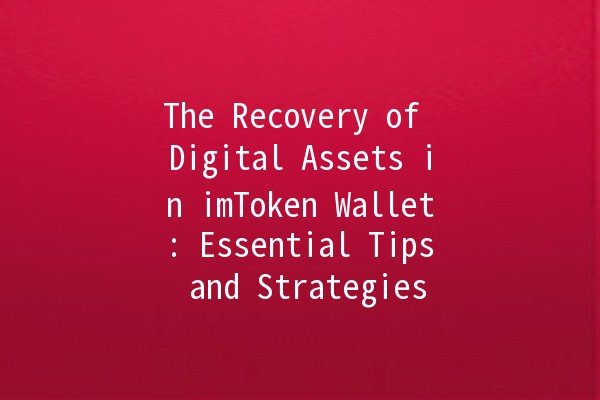In the everevolving landscape of digital finance, many users are turning to cryptocurrency wallets like imToken for managing their digital assets. While the convenience and security imToken offers are impressive, some users may find themselves needing to recover their digital assets for various reasons, such as forgotten passwords or lost access. This article will dive into practical advice and techniques crucial for effectively recovering digital assets in imToken Wallet while boosting productivity in the process.
ImToken Wallet is a popular mobile wallet for storing, managing, and transacting across various cryptocurrencies. The platform stands out for its userfriendly interface, robust security features, and multichain support, allowing users to manage Bitcoin, Ethereum, and other cryptocurrencies seamlessly.

However, as with any digital asset management system, users may encounter issues related to asset recovery. Understanding how to navigate these challenges is essential for ensuring the integrity and accessibility of your investments.
Explanation:
A secure backup is your first line of defense against potential asset loss. ImToken provides a feature to export the mnemonic phrase (12 or 24 words) needed for recovery.
Application:
Open the imToken app, and go to the wallet settings.
d the 'Backup' option and securely write down your mnemonic phrase on paper.
Store this paper in a safe place away from potential physical dangers.
Explanation:
The recovery seed is critical for asset recovery. If you lose access to your wallet or forget your password, you can restore your wallet using this seed.
Application:
Should you need to restore your wallet, open the app and select the option for recovery.
Enter your mnemonic phrase when prompted. Ensure you enter them correctly, as any error can prevent recovery.
Explanation:
Setting up twofactor authentication enhances the security of your imToken wallet, reducing the risk of unauthorized access.
Application:
Go to your account settings in the app.
Enable 2FA and link an authentication app like Google Authenticator.
Every time you log in or perform a transaction, you’ll need to provide a code from your authentication app.
Explanation:
Regular monitoring of your transactions can help detect unauthorized activities quickly, which may indicate issues with your wallet's security.
Application:
Make it a habit to review your transaction history weekly.
If you notice any discrepancies or unauthorized transactions, change your password immediately and consider recovering your wallet using the recovery phrase.
Explanation:
Maintaining the latest version of imToken ensures you benefit from security patches and updated features unavailable in older versions.
Application:
Regularly check for updates in your application store (iOS or Android).
Set your device to update applications automatically to avoid missing essential security patches.
If you've backed up your mnemonic phrase, and it's stored securely, your assets should be recoverable. If unsure, reach out to imToken support for guidance on your specific situation.
In case you've forgotten your password, your best option is to recover your wallet with your backup mnemonic phrase. This method allows you to access your wallet without knowing your password.
Unfortunately, if you don't have your recovery seed, recovering your assets becomes significantly more challenging. You may lose access to those assets permanently if there are no other recovery methods.
Yes, imToken provides customer support. You can contact them through the app or their official website for assistance with recovery issues or any other questions you have.
Not backing up your wallet puts your assets at risk of being permanently lost in the event of device failure, accidental deletion, or loss of access due to forgotten passwords. Regular backups form the cornerstone of asset safety.
Yes. Blockchain technology secures assets stored in wallets like imToken. However, the security of your wallet's access and recovery features greatly determines the safety of your assets.
Managing digital assets effectively can be cumbersome. Here are five productivityenhancing tips to streamline your asset management efforts:
Explanation:
Establishing clear financial goals can guide your investment decisions, narrowing the focus of the assets you wish to recover or enhance.
Practical Example:
Create a list of your current investments and outline your targets.
Use this list to prioritize which assets need attention during recovery or management.
Explanation:
Leverage tools and applications that can help you monitor your cryptocurrency portfolio's performance over time.
Practical Example:
Employ portfolio management apps to get realtime updates on your investments.
These tools often provide analytical insights that can help inform your recovery strategies.
Explanation:
The cryptocurrency landscape is dynamic. Staying informed about trends and best practices can improve your ability to make sound recovery decisions.
Practical Example:
Subscribe to newsletters or follow trusted crypto channels on social media.
Regularly engage with communities or forums to gain insights from other users' experiences.
Explanation:
If managing your digital assets becomes overwhelming, consider delegating parts of the process to trusted individuals or using professional services.
Practical Example:
Work with a financial advisor knowledgeable about cryptocurrency.
Assign specific tasks related to your wallet's security or performance tracking if you have a team.
Explanation:
Make it a habit to review your digital asset management process regularly. Reflecting on what works will help you refine your strategies.
Practical Example:
Hold a monthly audit meeting where you assess your recovery techniques.
Identify successes and areas for improvement to craft better approaches moving forward.
By implementing these practical tips and strategies, users can effectively recover their digital assets in the imToken wallet while enhancing overall productivity. The key is to act proactively and maintain an informed, organized approach to cryptocurrency management, ultimately leading to a smoother and more secure experience in the digital asset space.